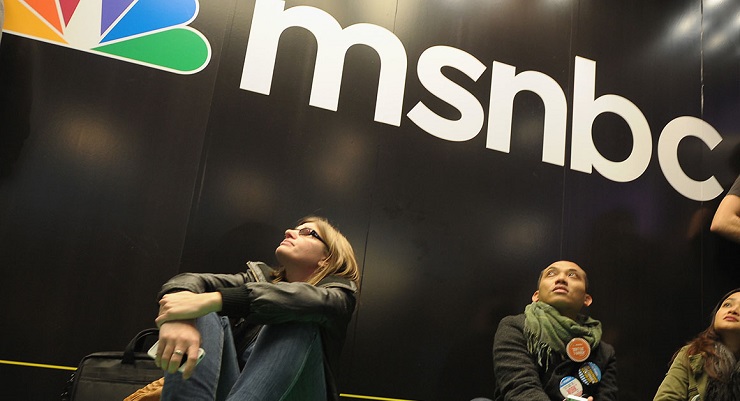MSNBC is currently running a self-congratulatory ad featuring the voice of a newscaster familiar to older Americans, claiming that one of the US’s proudest achievements is “a free and open press”. It ends with a message whose implication was probably unintended: “Some day there will be good news, if we work at it.”
The big news this week was all about the historic meeting between the leaders of North and South Korea, however on American channels, viewers could only see them holding hands, stepping and re-stepping over the raised line that separates their two realms. Were it not for France 24, they would not know that the meet and greet was but the beginning of an hours long get to know around a formal dinner for the heads of state and their spouses, or that each leader made warm declarations in front of a microphone.
The French government channel went the extra mile with a feature on South Korean restaurants serving traditional North Korean cold noodles. This was not a snide way of suggesting that Northerners can’t afford to heat their noodles, but a bona fide sought after dish, for which people in the south suddenly began queuing at restaurants in honor of the event.
While American television emphasized that ‘we have seen this movie before, so we shouldn’t get our hopes up, the French relayed the population’s obvious enthusiasm for what is a very different version from preceding efforts at peacemaking. (US rain on the parade was probably motivated by the fact that the two Koreas did their thing when, and how they saw fit, without American oversight, in another harbinger of the Empire’s dwindling power — as well as of China’s rise in what Americans still think is their exclusive preserve.
The most egregious failure of the US media, however, was the much hyped interview by senior foreign correspondent Richard Engel of the Russian lawyer Natalya Veselnitskaya, she of the infamous Trump Tower meeting of June, 2016, which continues to occupy a unique place in the ‘news’, mentioned almost every day, just in case viewers had forgotten the nefarious incident that gave rise to the Mueller investigation.
In order to build America’s case for ultimate war, the media refers to any Russians who are the news as being ‘close to the Putin government’. Engels presented the feisty young lawyer with emails showing that she had helped the Prosecutor General draft the official Russian response to an American request for information. But what is strange about that? Unlike Russia’s equivalent of our Attorney General, the lawyer is fluent in English and familiar with the US legal scene, neither of which is rue for the Prosecutor General. Does the US government not seek advice from outside professionals? (When I was a free lance translator in Paris I had several government or para-government entities as client, including the Ministry of Foreign Affairs. Did that in some way make me a French government informer, or taint me in any way? Governments have always employed ‘civilians’ as far back as history can trace. For Engels, however, this woman’s collaboration comes close to being a crime. (It’s a crime in US eyes for anyone to be ‘close to Russian government circles’ and the purpose of the interview was to establish that Veselnitskaya was not just a good-hearted private citizen trying to help Russian orphans grow up as US citizens.
To do that, Engels asks her to define herself. She answers: “I am a lawyer/.” And he says, ‘What what else?” to which she answers I am a government informant, and Engles pounces , implying that the Russian word ‘informant’ has the same meaning as the English pejorative term ‘informer’, for which a Russian- speaking friend informs me that there is another word, “stukach”, just as English has two words. The purpose of Engels’ interview is to provide definitive proof (almost two years after the event took place), that members of President Trump’s campaign, including his son, could be viewed as having committing treason by meeting with a Russian lawyer ‘close to the Kremlin’ before the election. Engels knew that most Americans are unlikely to find it strange that a person challenged to defend their integrity would state with obvious pride that they were a snitch.
The Russian purpose for the meeting was hardly surprising: it was to sound out the Trump campaign on the probability that it would do away with the sanctions imposed by President Obama, including the Magnitsky Act that prevents Americans from adopting Russian children (which is why the American participants in the meeting could accurately — if disingenuously — claim that the meeting was ‘about adoptions’).
This past week has illustrated two important features of American propaganda: On Korea: “Don’t get your hopes up for peace,” and on Russia, “Citizens working for their government are suspicious, because Russia has a different approach to world affairs from ours, and thus can be up to no good.”
Deena Stryker is an international expert, author and journalist that has been at the forefront of international politics for over thirty years, exlusively for the online journal “New Eastern Outlook”.

